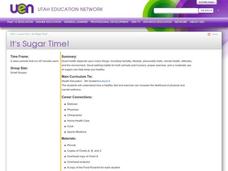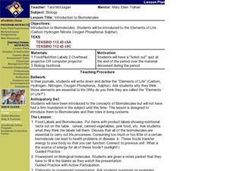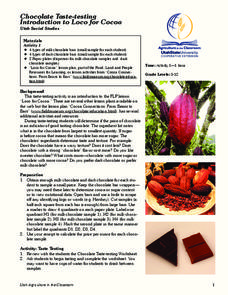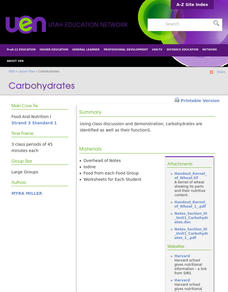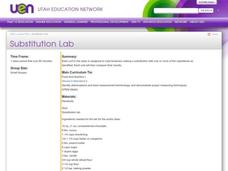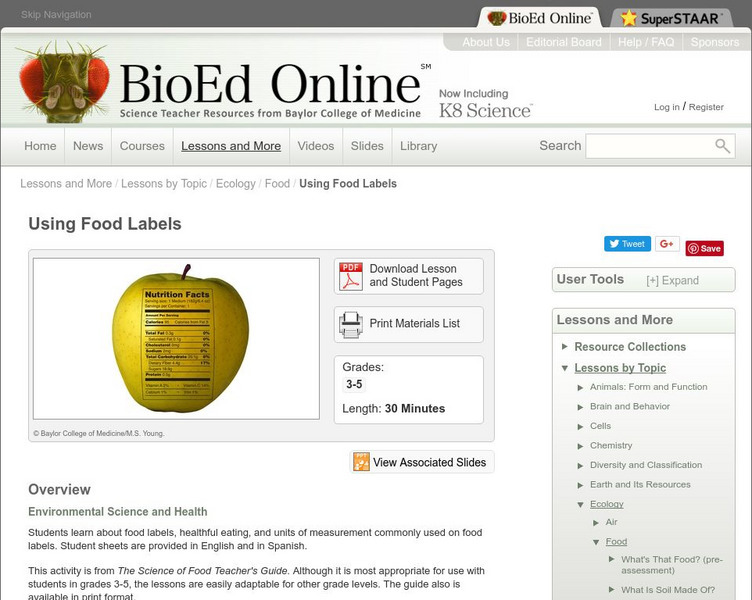Perkins School for the Blind
Student Store
Vocational training activities are extremely important for learners with intellectual or physical disabilities. Here is a great idea that will help your class become skilled at money handling, basic economic concepts, interpersonal...
Curated OER
Quinoa Pasta 2
Learners discover that a system of linear equations models this mixture of quinoa and corn in a collaborative task. Your learners receive all the relevant information in this second of three variants of tasks that ask them to find...
Curated OER
It's Sugar Time!
Fifth graders examine how good health depends upon many things, including heredity, lifestyle, personality traits, mental health, attitudes, and the environment.
Curated OER
Phonemic Awareness: Pronunciation of /ng/ Consonants
Students practice cononant sounds within reading passages. They articulate the /ng/ sounds and identify their placement in words. Working with a partner, they read a passage aloud and listen for correct pronunciation of sounds.
Curated OER
Introduction to Biomolecules
Students are introduced to biomolecules and their roles in livin systems. They are introduced to the "Elements of Life." Students write down and define the "Elements of Life." They are asked why they think those elements are essential...
Curated OER
Calories, Energy for Exercise and Life
Students calculate the number of calories they need daily and examine the impact of exercise on their caloric needs. They then determine if their daily caloric intake meets or exceeds their daily need.
Curated OER
Consumerism - Grocery Shopping
Learners watch a video on how marketers plan their strategies in supermarkets. In groups, they are given a set amount of money and asked to go through a grocery store simulation with a list. After the simulation, they discuss the...
Curated OER
Hatching chickens
Students recognize the need for gentle care of eggs. In this chicken hatching lesson plan, students observe the process of incubating eggs for hatching. Students find the materials needed to properly care for the chicks. Students...
Curated OER
High Five Burger
Fifth graders investigate agricultural sources. In this agricultural lesson, 5th graders read the book Have a Hamburger and See the U.S.A. and record each component of a hamburger. Students use a map of the U.S.A. to locate the...
Curated OER
An Egg is Quiet
Students discover information about animal eggs by reading the book, An Egg is Quiet. In this animal science lesson, students research different animals to find out what their eggs look like. Students use a provided chart to...
Curated OER
Snack Sack
First graders, after exploring agricultural products that can be considered snack foods, experience the concepts of ratio and probability. They analyze and record their class experience after dealing with the following snacks: peanut...
Curated OER
Chocolate Taste-Testing: Introduction to Loco for Cocoa
Young scholars compare chocolates using their five senses and determine the value of the chocolate. In this chocolate lesson, students sample various types of chocolate. Young scholars study the price per ounce of each bar to complete...
Curated OER
Candy Bar Fractions
Students explore the relationship between caloric expenditure and exercise, and see a real world use for fractions as they relate to daily life.
Curated OER
Dietary Fiber Introduction
Students research fiber and consider its sources, functions and importance to overall health. They sample high-fiber items, complete worksheets and take a quiz on their fiber research.
Curated OER
Ground Beef Experiment
Students identify what ground beef is and the difference in fat, flavor and moistness between the three types - regular, lean, and extra lean. Then, they conduct an experiment to compare the effect of pan frying
between three different...
Curated OER
Grocery Shopping
Students apply budgeting and shopping strategies. They study consumer shopping skills and guidelines to be a better shopper by comparing stores, comparing prices and unit pricing, brands, using coupons and not being fooled with...
Curated OER
Carbohydrates
Students listen to a lecture on carbohydrates focusing on the differences between complex and simple carbohydrates. They complete a demonstration and worksheet.
Curated OER
Substitution Lab
Young scholars in cooking class prepare and cook brownies, making a substitution with one or more of the ingredients as instructed. They compare their results in regard to appearance, flavor and texture. They develop an understanding of...
BioEd Online
Bio Ed Online: Using Food Labels
Do you know how to read a food label? Food labels provide important information about the nutritional value of foods. In this lesson students will learn about food labels, healthful eating, nutrition facts, and units of measurement...
Indiana University
Area 10 Math and Technology Project: Nutrition Labels
Lesson Plan involving all aspects of reading a nutrition label. Emphasizes math skills. Includes links to a teacher outline, student copies and reference materials.
Children's Museum
The Children's Museum of Indianapolis: Health House: Food, Fitness and Fun: 24/7
Engage your students in what it means to live a healthy life. They'll learn how to read food labels and understand basic nutrition. They'll take part in fun active play and learn about exercise benefits. Learn why healthy habits such as...
Iowa State University
Iowa State University: Reading Labels for Fat Types
Through this simple lesson plan, students learn to read and undertand nutrition and fat content as it is relayed through food labels. Included are several overheads and a handout on the different types of fats present in the foods we eat.
PBS
Pbs Teachers: Fast Fats: An Analysis of America's Obsession With Fast Food
Analyze parts of a food label, and determine the amount of fat and calories in average foods. Conduct an observational experiment and examine the food choices of classmates.
Michigan Reach Out
Newton's Apple: Body Fat
Through these lesson plans, investigate the different types of fat found in food and found in the human body. Discuss the functions and problems associated with dietary fat and make wise food choices based on what you learn about fat,...




